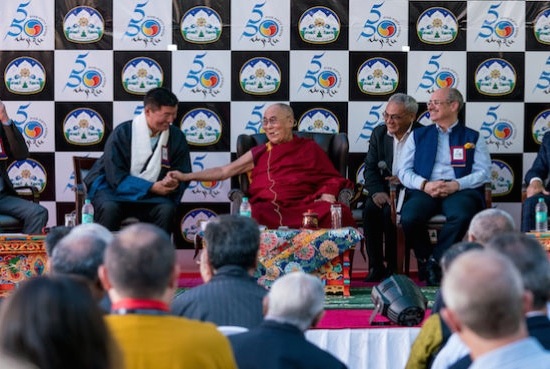 Dharamshala — “China tried to eliminate Tibet’s cultural identity through brainwashing, bribes and even force. But it failed. Chinese leaders never expected Tibet issue to remain alive even after 50 years. But it is alive and growing stronger,” said His Holiness the Dalai Lama at the Five-Fifty Forum.
Dharamshala — “China tried to eliminate Tibet’s cultural identity through brainwashing, bribes and even force. But it failed. Chinese leaders never expected Tibet issue to remain alive even after 50 years. But it is alive and growing stronger,” said His Holiness the Dalai Lama at the Five-Fifty Forum.
The Tibetan government's three day Five-Fifty Forum commenced on October 7th, attended by hundreds of academics and professionals, and graced by His Holiness.
Over 185 participants from 21 countries converged in Dharamshala for the three-day forum, organized by the Department of Information and International Relations (DIIR) of the Central Tibetan Administration (CTA) at Hotel Pavilion in Dharamsala. The participants included some of the top political strategists, politicians, communication experts, activists, bloggers and writers.
In the inaugural speech of the forum, Tibetan President Sikyong Dr Lobsang Sangay described the three-day forum as an opportunity to express unvarnished opinions, suggestions, and recommendations to re-energize the Tibet movement in the next five to fifty years.
“I welcome all of you here, we have chosen each one of you individually by looking into your longstanding contribution towards the Tibet cause, or for your expertise and experience in the field of international relations.
“After the forum, we will formulate our future course of action by taking into account your inputs. Therefore, we would want you to advise us just as you would advise your respective governments, MNCs or organisations that you work for,” he said.
He further spoke about the current political backdrop of the world, illustrating the rise in nationalist and extremist sentiments, and the decline of liberalism and Internationalism, explained the increased global attention on Tibet riding on the wave of liberalism in the early 90s and late 80s, and expressed concern at the repercussions of the rise of nationalistic global politics on the Tibet cause.
His Holiness the Dalai Lama graced the second day of the Five-Fifty Forum, addressing the crowd, saying, “Historically, Tibet used to be a great nation comparable to the Chinese and Mongolian empires. However, after the disintegration of the Tibetan empire, the Tibetan nation gradually lost its sheen, compelling its spiritual leaders to focus only on religion.
“Even then, despite the political uncertainties, the three traditional provinces of Tibet were able to maintain a unified Tibetan identity due to the strength of the Tibetan language,” His Holiness explained.
“Tibetans are undergoing great turmoil and suffering imposed by China even now. However, we can take heart from the fact that we have a thousand millennium old cultural heritage. And despite China’s repression, Tibetans inside Tibet has shown great valour and courage in preserving the indomitable Tibetan spirit ” His Holiness said.
His Holiness also recalled China’s attempts to annihilate Tibetan religion and culture during the Cultural Revolution. “China tried to eliminate Tibet’s cultural identity through brainwashing, bribes and even force. But it failed. Chinese leaders never expected Tibet issue to remain alive even after 50 years. But it is alive and growing stronger,” he said.
“There are many communities fighting for freedom around the world. However, most of them employ violence to achieve their goals. Tibetans on the other hand have always been committed to the methods of peace and non-violence despite the hardships that we have faced,” His Holiness said.
His Holiness the Dalai Lama also encouraged the inclusion of secular education in academic curriculum and said modern education is insufficient to create holistic happiness as it focuses more on material development.
“Despite the massive advances that modern education has made, it has remained vastly insufficient in the understanding of the human brain. To inculcate emotional hygiene along with physical hygiene in our brains, we need to start incorporating the knowledge of ancient India in the form of secular education in school syllabuses,” His Holiness said.
“Nations should come together to tackle global issues such as climate change and environmental conservation. Issues such as global warming are not constrained by artificial national boundaries. It will affect all and therefore, we need a collective effort to resolve these issues,” His Holiness said.
“If India, a country of such huge population with different religious backgrounds can maintain religious harmony, why not the rest of the world?” His Holiness asked.
Regarding the five-fifty forum, His Holiness said that this kind of intensive discussion on Tibet and its future would help energize a renewed international voice on Tibet that would be help the Tibet cause.
The Five-Fifty Forum is a conference sought to chart a five-year plan for pursuing a return to dialogue and negotiations with China. If that’s unachievable, Tibetans will plan for another 50 years of resistance to China’s occupation, systematic repression and attempted cultural genocide in Tibet.


![Tibet has a rich history as a sovereign nation until the 1950s when it was invaded by China. [Photo: File]](/images/stories/Pics-2024/March/Tibet-Nation-1940s.jpg#joomlaImage://local-images/stories/Pics-2024/March/Tibet-Nation-1940s.jpg?width=1489&height=878)















